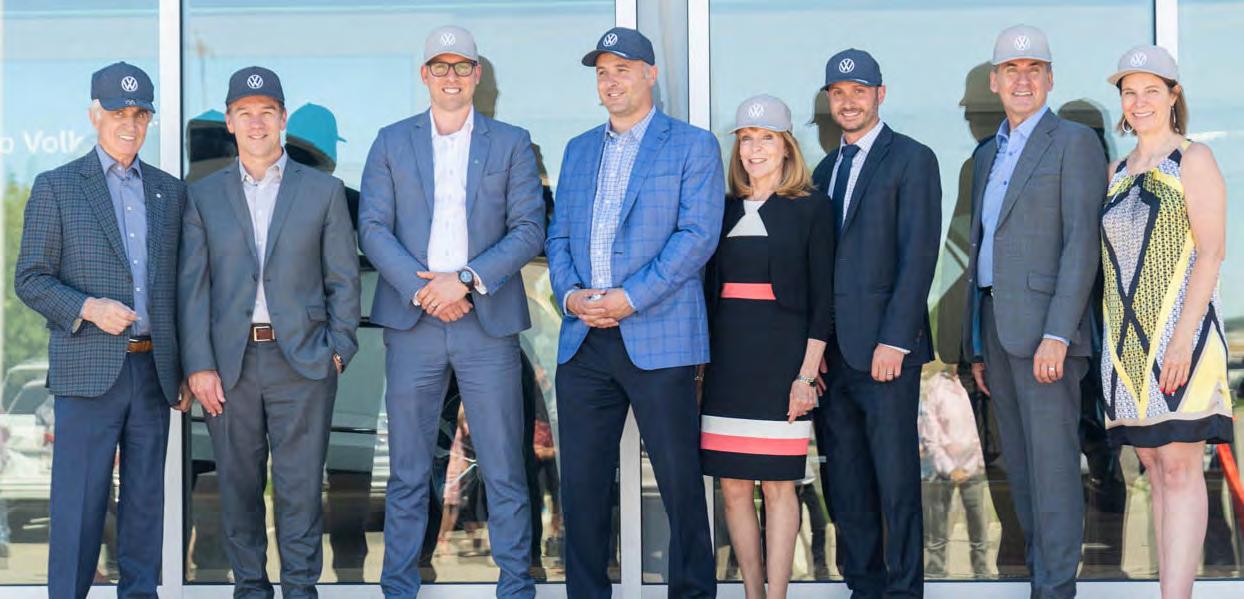
5 minute read
The Solution to the Labour Shortage Problem Might be Right Under our Noses

BY ADAM LEGGE, PRESIDENT, BUSINESS COUNCIL OF ALBERTA
Advertisement
Alberta’s economic recovery story continues as we head into the latter half of 2022. In fact, economists project that the province will regain 2014 levels of economic activity as commodity prices hit a near-decade high and unemployment rates hit a five-year low recently.
However, this robust economic environment has led to a variety of challenges, including inflation and its painful remedy, rising interest rates. But for businesses, the primary challenge keeping CEOs up at night is labour shortages.
Labour markets in Canada are tighter than they’ve been in decades. There are over one million unfilled jobs across Canada, and over 100,000 of them are in Alberta. Alberta’s job vacancy rate is currently 5.2 per cent, meaning one in 19 jobs is vacant. This is up from one in 42 jobs pre-pandemic. At the same time, while many jobs are looking for people, relatively few people are looking for jobs as Alberta’s unemployment rate has fallen to record lows – 4.9 per cent in June.
This all adds up to businesses having an exceptionally difficult time filling vacant positions. More than threequarters of Alberta businesses report that labour-related constraints are limiting their ability to meet demand.
Structural changes such as an ageing population and shifting work preferences, and pandemic-related factors such as slowed immigration and worker absences, have added to the labour shortage we see today. With several different contributors, there are certainly many possible solutions (e.g., investing in automation or increasing immigration levels).
But one important opportunity that is often overlooked is enabling the participation of Albertans who are not currently in the labour force and belong to groups underrepresented in the labour force. There is a huge opportunity to add more workers to Alberta’s economy by removing critical barriers to participation faced by various demographic groups, including women, persons with disabilities and older workers. These groups consistently have lower participation rates than their counterparts. And while immigrants, visible minorities and Indigenous peoples have similar participation rates to their counterparts, people from these groups are more likely to be underemployed with respect to their training, exacerbating the skills shortage reported by employers.
While any individual person may face challenges or barriers to employment and career success, research consistently demonstrates that many face systemic barriers based on the group or groups they belong to. Barriers can include discrimination in the hiring process, harassment and micro-aggressions from colleagues, self-selection into “safe” or “appropriate” jobs, or a lack of transportation, accommodations, supports or training. Ultimately, this leads to the chronic underrepresentation and underemployment of these groups in the labour market.
Addressing these barriers is undoubtedly important from an equity and inclusion perspective. But furthermore, removing barriers to labour force participation could assuage the critical labour shortages facing Alberta’s economy. If we can improve the engagement of these groups, well over 100,000 people could be added to Alberta’s labour force. Closing the participation gap for women alone can add over 140,000 people. Ultimately, helping Albertans have equal opportunity to pursue the work they want would go a long way to filling the 100,000 vacant jobs in the province.

Wood Automotive Group Opens New Dealership
Okotoks Volkswagen First of Its Kind in Canada

Chalk up another first for the Wood Automotive Group with the opening of Okotoks Volkswagen. The store is a satellite operation of the Wood Group’s South Centre Volkswagen in Calgary and is unique in Canada.
“Okotoks Volkswagen builds on the success of our South Centre location,” says Gerry Wood, executive chair of the Wood Automotive Group. “It has a smaller footprint than most traditional dealerships but offers the same exceptional service. This may be the first, but it’s the model Volkswagen Canada is following closely.”
“Reaching out to customers. Bringing more convenience to customers and bringing them the level of service that is expected from owning a Volkswagen, so for us its so important to be well located,” says Pierre Boutin, president and chief executive officer, Volkswagen Group Canada, who traveled to Okotoks for the store opening. “We’ll be working with and following Okotoks Volkswagen closely to bring success here and across the country.”
Okotoks Volkswagen is in the former Okotoks Ford store on Westland Road. The building has undergone a near total transformation with renovations build to Volkswagen’s exacting standards. It now includes a modern, customer-friendly showroom, and a state-of-the art service department with twelve service and detailing bays including a specialty bay for electric vehicles. The bank of EV charging stations has two available for public use.
Joshua Buchanan, the general manager at South Centre Volkswagen has responsibility for the Okotoks store as well.
“This is such an exciting opportunity,” says Buchanan, “We love Calgary customers, but we will be the first to reach out to welcome new customers from throughout Southern Alberta. There are a lot of VW fans in the sunny south.”
Buchanan says that sales have been strong since opening day in mid-July, and the service department has a steady stream of appointments.
Okotoks Volkswagen is part of the on-going growth of the Wood Automotive Group. The company will be moving its Big 4 (Chrysler, Dodge Jeep, Ram) store on Macleod Trail, to a new dealership now under construction in Taza Park, near the Grey Eagle Casino on the Tsuut’ina Nation. The store is scheduled to open in 2023.
ABOVE: GERRY WOOD; EXECUTIVE CHAIR (WOOD AUTOMOTIVE GROUP), JASON LEGERE; SENIOR DIRECTOR, SALES, (VOLKSWAGEN CANADA), JOSHUA BUCHANAN; GENERAL MANAGER (OKOTOKS VOLKSWAGEN), RORY WOOD (WOOD AUTOMOTIVE GROUP), ELAINE WOOD (WOOD AUTOMOTIVE GROUP), CAILEAN WOOD (WOOD AUTOMOTIVE GROUP), PIERRE BOUTIN; PRESIDENT & CHIEF EXECUTIVE OFFICER (VOLKSWAGEN GROUP CANADA) AND MAYOR TANYA THORN (TOWN OF OKOTOKS).
Great Leadership Leaves a Lasting Legacy

University of Calgary Properties Group is proud to recognize change-makers in our community and will be awarding the Legacy Leadership award for the third year at the Business in Calgary Leaders Awards in November. The award will be presented to a deserving alumnus that has demonstrated a sustained impact on our city.
To be a great leader in times of change and uncertainty requires problem-solving ingenuity, discipline, an inspiring and ambitious spirit, community commitment and an unwavering desire to collaboratively move the needle. We hope you will join us to celebrate the leaders that make Calgary a great place for all of us.
Visit businessincalgary.com/leaders for more information.










